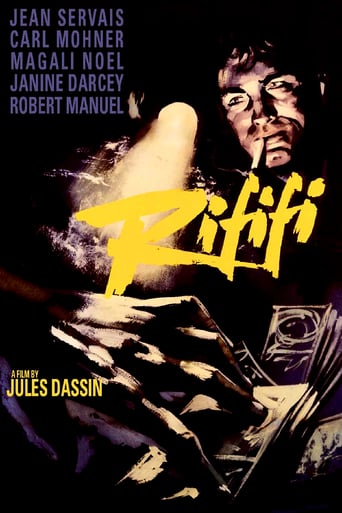Yashua Kimbrough (jimniexperience)
"Rififi"This gangster-heist film noir was a one-of-a-kind when it first came out , and still one of the best to do it today. An inspiration for many to come, this is a multi-layered crime movie beyond just the heist itself. Also featuring excellent camerawork to create the mood with push-ins, close-ups, and character blocking.
--------------------------------------------------------------------
Tony is fresh from jail and is deteriorating in health and gambling debt. His old friend, Jo, reaches out to Tony with a heist to get him off his feet: a window-shop diamond robbery. Tony declines at first, but after learning his ex-wife (whom left him while in jail) is in town and in bed with a nightclub owner Grutter (with ties to the mob and police), he accepts Jo's offer on two conditions: no guns, and they go for the bigger stash inside the safe.Tony and Jo are accompanied with two men: Mario the keymaker, and Cesar the safecracker. The four of them scout out the landscape: traffic times, surrounding store hours, postman or floral delivery schedules, police patrol schedules, etc. They get their hands on the bank's security system and run test trials to ensure they have sure-fire ways of diffusing the system. They manage to execute the perfect heist and everything goes to plan .... Except fore the "human element" ...Cesar fell in love with a singer who works at Grutter's nightclub, and he discovers who are the players behind the heist. He hires his dope fiend brother to kidnap Cesar , whom then snitches on Mario ,, who takes the fall for Tony - costing both him and his wife their life. Tony, still hungry for revenge over Grutter taking his wife, now wants vengeance for his good friend's death. Grutter kidnaps Jo's son and holds him for ransom, and Tony gets the drop on Grutter's secret villa. Jo isn't aware Tony is breaking his son out and delivers the money to Grutter ..........Long story short things get ugly in the name of stolen money10/10
JohnHowardReid
Regarded by many critics as the finest film noir ever made, the 1955 Rififi directed by Jules Dassin is available on a 7/10 Criterion DVD. (Why only 7/10? Two image break-ups, including an extended impasse at the beginning of the robbery which undermines this sequence).My personal opinion is that the movie runs far too long and tends to out-stay its welcome, thus allowing the viewer to focus on holes in the plot. For example, I feel trims should have been made to Magali Noel's rendition of the title song, as well as the ailing Jean Servais' climactic drive to Tonio's home, both of which seem to go on forever. The famous, no-dialogue robbery sequence, on the other hand, is commendably taut. Aside from Jules Dassin himself, who, despite his curiosity value, makes an unconvincing Italian romantic, the cast rates as uniformly fine. Servais is especially impressive. Great lighting photography by Agostini and moody sets by Trauner (as well as the inspired use of real Parisian locations) help secure Rififi a place on anyone's must-see list.
elvircorhodzic
RIFIFI is an intelligent and brutal thriller. The main protagonist is an old gangster who, after leaving the prison, at the urging of friends, decided to rob a jewelry store. Robbery is quite complicated, but a team of four men is ready. The robbery was carried out successfully. But his team, after the fatal error of one member, becomes the target of a rival gang ...This is one of the few films in which the script, scenery, dialogues, music, characterization and acting are almost perfectly aligned. It's an amazing blend of a cold-blooded crime and human sincerity. I must admit that some scenes, despite the undeniable quality, are too brutal. In this sense, this thriller has overshadowed some of Hollywood thrillers of fifties, which openly emphasized the brutality and explicitness. The story is somewhat predictable, but the human factor is secretive and mysterious. The mere robbery is brilliantly designed. Mr. Dassin created the poetry of motion without human speech. The robbery takes a long time and was carried out in a great atmosphere in which the tension can be cut with a knife. Of course, the knife sometimes "wanders", so any sudden movement or movement of an object is reminiscent of a human scream. I've enjoyed.The main protagonists are sincere and sympathetic (in a strange way). A rival gang is the embodiment of a crime which involves prostitution and drugs. Their performance is menacing and brutal, which is positively affected on the atmosphere of the film.Jean Servais as Tony "le Stéphanois" is the brains of the gang, a stubborn and an experienced criminal, who apparently can edit everything except his own life. Carl Möhner as Jo "le Suédois" is Tony's younger disciple. A handsome strongman who has a wife and a son. He is the protagonist who will have to choose between so desired prey and his own blood. Robert Manuel as Mario Ferrati is amiable Italian who carelessly enjoys with his beauty. The protagonist, who brings serenity in a thriller atmosphere. Jules Dassin as César "le Milanais", is the „director". There is no safe that he could not open. He is a little rascal whose weakness is women.I claim that this movie is one of the best French thrillers of all time.
William Samuel
Nobody does noir like the French. They invented it, and although American and Japanese directors have made exceptional entries in the genre, the French still do it best. For evidence, I present exhibit A, Rififi, one of the greatest gangster/heist movies ever made. Aging gangster Tony, just out of prison, gathers his friends for one last job; cracking the safe at Paris's finest jeweler. It will be the most ambitious job of their careers, with an incredible payoff. And it doesn't end with the heist either. When rival gangster Pierre realizes what they've done and decides he wants in, everything they've accomplished is put in jeopardy.Rififi doesn't waste much time establishing the characters or the setup. Back-story isn't a major concern here. Each man has his own life and personality, but the important thing is that when it comes to business, Tony, Jo, Mario and Caesar are dead serious. They know the rules, and the stakes, and are the absolute best at what they do. Their preparations are complex and painstaking. Casing the joint, memorizing the opening times of the surrounding businesses, finding a way to defeat the alarm system, all are done with the utmost care.All of this leads up to one of the tensest scenes in all cinema; the heist itself. Over half an hour, with no music or dialogue, only the (very quiet) sounds of the men at work. And what work it is. Watching these four men chisel their way through the roof, disable the alarm, and crack the safe is like watching Michelangelo sculpt or Arnold Palmer play a round of golf. It is pure precision, with no margin for even the slightest error. And what creativity they bring to their trade! I have never seen such ingenious uses for a tube of caulk or an umbrella.Most films would have difficulty going this long without sound, but here the silence is an asset. The lack of sound underscores the fact that their work relies on near-total silence. Because there is no music or other background noise, we are keenly aware of every clink of the hammer, every rattle of loose concrete, and the fall of every footstep. The silence creates tension more effectively than any ominous music could. And all the while the clock is, quite literally, ticking. Time itself is their enemy. If Rififi ended with the successful conclusion of their daring burglary, it would be a very good movie. But it does not satisfy itself with a simple happy ending. As in so many of the best noirs, the second half tells how the best plans go awry, and everything begins to fall apart. A minor act of carelessness makes them targets of the most ruthless crime boss in Paris. The body count rises alarmingly, and the bad guys soon gain what is arguably the ultimate leverage.The last act is a masterwork or growing tension, sudden reversals, and hard decisions. And the final scene, which I will not give away, is probably the best of all. The pounding, ominous music, the rapid series of cuts, and the gravity of the situation contrast with the innocence of a young child in a way that is simply incredible. Rififi is fully equal- and perhaps superior to- Chinatown, The Big Heat, or Le Samourai. If you are a fan of classic noir, I highly urge to see this film.




